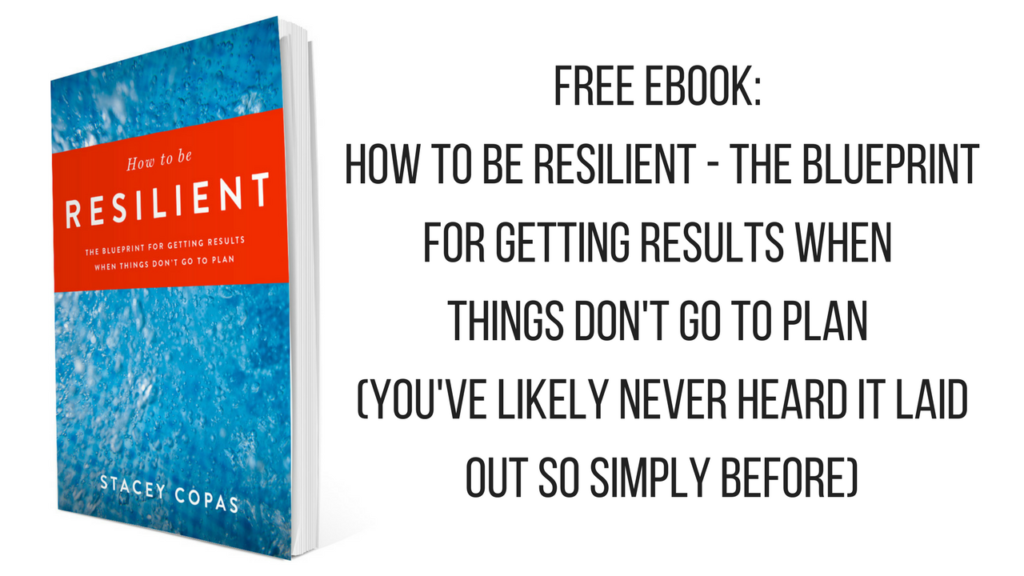 A warning before you start to read:
A warning before you start to read:
You’re going to think, “why didn’t I think of that” or “I knew that”.
Keep in mind: There is a difference between knowing something and putting that knowledge to good use.
What is better to be thinking instead is, “How do I put that into practice” or “How could I do this better?”
You don’t have an eternal supply of time, so stop procrastinating – the only person standing between you and resilience, guaranteeing you a full and satisfying life, is you!
1. Watch Your Language
Changing your language is one of the easiest ways to get back on track when something goes wrong.
I don’t mean stopping (or starting) to use expletives.
Call things as they are.
Not being promoted at work is not “devastating”.
Disappointing, frustrating, yes, but not devastating.
Being diagnosed with a terminal illness or losing a loved one is devastating.
There is a time and place for truly negative, dark words and expressions.
Do not exaggerate.
Be objective about the magnitude of the event.
Harnessing the power of words will go a long way toward becoming more resilient.
It can be as simple as trying to ask someone, “How are you?” in as positive a way as possible.
People are used to “How are you?” just being a greeting, with the person saying it not caring what you’ll say in response.
You’ll attract interest by throwing something positive and different at people and genuinely being curious.
But don’t ask the perpetual whiners this question because they’ll just bring you down with their endless complaining.
2. Be Inspired
Inspiration is our drive to achieve.
It is our vision and our purpose in life.
When something doesn’t work out as planned, revisit the purpose and reasons behind it.
If you think about why you want to attain that particular goal, you will feel more energised and better able to stay focused on overcoming the problem.
Often people spend a lot of energy looking for inspiration.
What I’ve discovered is that while it is good to get top up inspiration from external sources, if your primary inspiration does not come from within, it is not sustainable.
Here are a few tips to connect with the internal inspiration:
What is the first thing that comes to mind when you ask yourself what you think about most often – every day, every week, or just in general.
Ask yourself what you are passionate about and why.
If money or time weren’t an object, what would change for you?
What would you be doing differently?
What do you talk about the most?
What are your strengths?
Is there anything in the world you wish were different?
If you could, what would you change?
What do other people ask for your opinion and advice about?
When you feel most positive and energetic, what are you doing?
All these questions will help you understanding the inspiration behind your goals and make you better able to achieve them.
3. Seek To Expand
Expand the world and lives of those around you by giving time and / or money, whichever you have the capacity to give more freely.
It feels wonderful to be able to impact less fortunate people positively, and it will also help you expand your own world.
Share your knowledge.
Helping others achieve their goals will lead you to yours.
Napoleon Hill shared this in his book Think and Grow Rich when he said, “it is literally true that you can succeed best and quickest by helping others to succeed.”
Don’t expect anything in return.
The reward is in helping others.
Think about what you can do to help others grow and expand.
How often have you been helping someone else and you’ve figured out a solution to a problem of your own?
4. Be More Positive
Studies show that resilient people think differently from those who lack resilience.
More specifically, in painful or challenging situations, they are able to experience negative as well as positive emotions.
They mourn loss, but also find redeeming value in adversity.
When a non-resilient person faces a difficulty, their feelings are negative, whereas resilient people tend to look for the silver lining in even the most challenging of circumstances.
They acknowledge that something has gone wrong, but also find a way to see the positive.
They are able to find opportunity where others see nothing but problems.
5. Don’t Neglect Your Own Needs
There is a fine line between helping others and being selfless, and once you cross that, you are no longer in a good position.
Women are particularly prone to this, especially after they have children.
The added responsibility of being a mother, a partner and also having to work leaves less room for the woman’s own needs.
Women start to feel guilty, and this feeling can become overwhelming.
It is essential to make time for yourself.
Healthy habits are key to mental and emotional resilience.
One such habit is taking regular mental breaks, like a regular meditation practice or simply daydreaming.
Interestingly enough, our brains are quite active in moments when we aren’t doing much.
MRI images of a “resting brain” show significant activity in the regions associated with memories and decision-making.
And on that note…
6. Be Decisive.
Make decisions and take action.
Do not procrastinate, hoping things will just work themselves out.
If you don’t make an effort, your situation won’t improve.
Not making a decision is a decision in itself.
Take the time to weigh the pros and cons of any and all approaches when making important decisions.
Don’t let anything distract you, and set yourself a reasonable deadline to make the decision.
If you’re struggling, ask for advice.
7. Strengthen Your Network
Having caring and supportive people around you can be like a defensive barrier in times of trouble.
Having people you can trust and confide in is crucial to becoming more resilient.
These people won’t make your problems go away – don’t expect them to – but they will give you an opportunity to share your feelings and come up with possible solutions.

